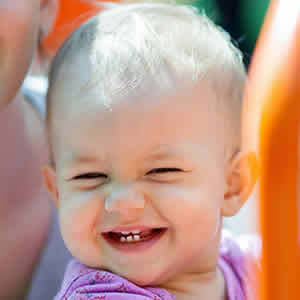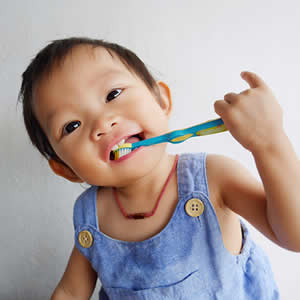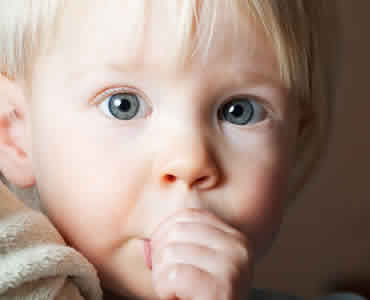Baby Teeth
About Baby Teeth
Though temporary, baby teeth are essential to speech development, smiling and chewing. And — just as importantly — they preserve space for permanent teeth.
Caring for Baby Teeth

Because tooth decay can begin as soon as your child’s first tooth appears, caring for their teeth should start then as well.
To get your child used to the sensation of cleaning, Dr. O recommends cleaning your baby’s gum with a damp, soft washcloth. Then, when that first little bottom tooth pops out, you can start using a very soft brush. You may want to try a fingertip brush which has especially gentle bristles.
Toothpaste Time

Your child can begin to use the fluoridated toothpaste as a they have a few teeth.
However, they should only use a small bit – Smear between 0 to 2 years and pea size above 2 years – and they should not swallow it. Have them swish the toothpaste around in their mouth and then spit it out.
You will probably need to brush your child’s teeth until he or she is around 6 or 7 and can do it properly themselves. To avoid potential teeth stains from swallowing fluoride, wait until your child consistently swishes and spits out the toothpaste before starting to use toothpaste with fluoride. And always look for The American Dental Association (ADA) seal of approval on any dental products before buying.
Thumbsucking

Many infants and small children use thumb sucking as a way of self-soothing. And, while most kids will give the thumb the heave-ho by age 4, some do not.
In the majority of cases, thumb sucking will not cause lasting damage to teeth. However, if it extends past 4 and appears to be aggressive (sucking vs. passively having the thumb rest in the mouth), contact us to discuss it. Long-term, aggressive thumb-sucking can affect tooth alignment and proper mouth growth and can even affect face shape not to mention lead to complex and costly orthodontia.
We’re here to help you. Just ask.

Contact Us:
- 3015405757
- 20300 Seneca Meadows Pkwy, Suite 100, Germantown, Md 20876
